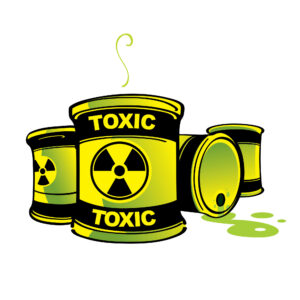Is The Science Solid?
Author: Dr. Stephen Chaney
 As Earth Day approaches, our thoughts turn to our environment. Most of the concern is with global warming, and rightly so. But should we be concerned about the effects of toxic chemicals in our environment on our health – or, more importantly the health of our children?
As Earth Day approaches, our thoughts turn to our environment. Most of the concern is with global warming, and rightly so. But should we be concerned about the effects of toxic chemicals in our environment on our health – or, more importantly the health of our children?
The short answer is, “Maybe.” But let’s delve a little deeper.
In a past issue of “Health Tips From the Professor” I examined the evidence suggesting that toxic chemicals in the home could cause childhood asthma. That is alarming because asthma can predispose individuals to other diseases and affects quality of life.
But what if that were only the tip of the iceberg? For example, a recent headline stated: “More Toxic Chemicals [In Our Environment] Are Damaging Children’s Brains”. If that headline is true, it’s downright scary.
The authors of this study suggested that toxic chemicals which are abundant in our environment can cause decreases in IQ and aggressive or hyperactive behavior in children – and that those changes may be permanent.
The Study Behind The Headlines
 The paper that generated the headlines (Grandjean & Landrigan, The Lancet Neurology, 13: 330-338, 2014) was a review of the literature, not an actual clinical study.
The paper that generated the headlines (Grandjean & Landrigan, The Lancet Neurology, 13: 330-338, 2014) was a review of the literature, not an actual clinical study.
Based on published clinical studies, the authors identified 11 chemicals commonly found in the environment as developmental neurotoxins (toxins that interfere with normal brain development) based.
This finding compares with 6 developmental neurotoxins that they were able to identify in a similar study in 2006.
The authors were not claiming that the number or amount of neurotoxic chemicals changed between 2006 and 2014. They were saying that science has advanced to the point where we can classify six more chemicals that have been in our environment for years as developmental neurotoxins.
Even more worrisome, the authors postulate that many more environmental neurotoxins remain undiscovered, and these environmental neurotoxins come from many sources.
- Some are industrial pollutants.
- Some are persistent groundwater contaminants.
- Some are insecticides and herbicides used in agriculture.
- Some are found in common household products and furnishings.
Could Toxic Chemicals Lower Our Child’s IQ?
 To answer that question, you need to look at some of the studies they cited in their review. For example:
To answer that question, you need to look at some of the studies they cited in their review. For example:
- Elevated blood lead levels in children are associated with as much as a 7-point decrease in IQ (Lamphear et al, Environmental Health Perspectives, 113: 894-899, 2005).
The effects of many of the neurotoxic chemicals they identified on IQ were difficult to quantify. However, the authors estimated that average exposure of US children to just 3 of the best studied chemical neurotoxins (lead, methylmercury, and organophosphate pesticides) was sufficient to lower their average IQ by 1.6 points.
The authors spoke of the environmental neurotoxins they identified as representing a “silent pandemic of a chemical brain drain” that could cost the US economy billions of dollars.
One of the blog posts I read on this topic summarized the consequences in a very graphic manner. It said:
If one child’s IQ is reduced by 5 points, it doesn’t appear to make a big difference. For example, that child might be:
- A little slower to learn.
- A little shorter of attention.
- A little less successful at tests and at work.
That might result in $90,000 in lost lifetime earnings.
However, if the average IQ of every child in the US were decreased by 5 points, the effect becomes significant:
- Only half as many members of the next generation would be “intellectually gifted”.
- Twice as many of the next generation would be “intellectually impaired”.
- Lost productivity could be in the billions.
Of course, statements like that are a bit over the top. Drs. Grandjean and Landrigan did not claim that the net effect of the chemicals they identified was a 5-point drop in IQ. Nor did they claim that all US children were affected equally.
Still, it’s enough to make you think.
Are Toxic Chemicals Causing Behavior Problems?
 The authors cited numerous studies linking the chemical neurotoxins they identified to aggression and hyperactivity. But perhaps the most compelling reason to suspect that environmental chemicals may be affecting brain development is the spiraling incidence of developmental disorders such as autism and ADHD. For example:
The authors cited numerous studies linking the chemical neurotoxins they identified to aggression and hyperactivity. But perhaps the most compelling reason to suspect that environmental chemicals may be affecting brain development is the spiraling incidence of developmental disorders such as autism and ADHD. For example:
- Autism has increased by 78% since 2007 and now affects 1 of 88 eight-year-old children.
- ADHD has increased by 43% since 2003 and now affects 11% of children aged 4-17.
Some of this increase could be due to better diagnosis of these conditions, but nobody believes that all of it is due to improved diagnosis. The authors claim that much of this increase is likely due to environmental exposure to the kinds of developmental neurotoxins they identified.
Is The Science Solid?
 Of course, you have seen these kinds of warnings before. Is this crazy talk, or is it something you should take seriously? What is the truth? Is the science solid?
Of course, you have seen these kinds of warnings before. Is this crazy talk, or is it something you should take seriously? What is the truth? Is the science solid?
The problem is this is a very difficult area of research. You can’t do a gold standard double-blind, placebo-controlled clinical trial. Nobody in their right mind would give one group of children toxic chemicals and the other group a placebo.
The studies cited in this paper were mostly population studies. Basically, this means that they compared children with exposure to certain toxic chemicals to a control group that was as similar as possible to the first group except that their exposure to the toxic chemicals was less.
The limitation of this kind of study is obvious. We are usually comparing children from different locations or of different backgrounds. We almost never know if we have controlled for all possible variables so that the groups are truly identical.
Consequently, it becomes important to ask how many studies come to the same conclusion. For some of the toxic chemicals, such as lead, methylmercury, and organophosphate pesticides, the weight of evidence is very strong. For some of the newer additions to their list of developmental neurotoxins, it is clear that the chemicals have neurotoxic properties, but the significance of those effects on the developing human brain are hard to quantify at this point.
So, rather than ask, “Is this true?”, we should ask, “What if it were true?” The consequences of lowered IQ and developmental behavioral problems are so significant that it may not make sense to wait until we have unassailable scientific evidence before we act.
We don’t need to panic. The science isn’t that strong. But we should take sensible precautions. The developmental neurotoxins identified in this study come from many sources. Here are the sources and sensible precautions we can take.
- Some are industrial pollutants. For these, we need to lobby for better environmental regulation.
- Some are persistent groundwater contaminants. For these we need to drink purified water whenever possible.
- Some are insecticides and herbicides used in agriculture. For these we need to buy organic, locally grown produce whenever possible.
- Some are found in common household products and furnishings. For these we need to become educated label readers and use non-toxic products in our home whenever possible.
The Bottom Line:
1) A recent review claims that there is a good scientific basis for classifying at least 11 environmental chemicals as developmental neurotoxins that are likely to reduce IQ and contribute to behavioral problems in US children.
2) The science behind the claims in this review is solid, but not iron clad. This is an area of science where it is virtually impossible to come up with a definitive conclusion.
3) However, there are times when we need to simply ask ourselves: “What if it were true?” The consequences of lowered IQ and developmental behavioral problems are so significant that it may not make sense to wait until we have unassailable scientific evidence before we act.
4) We all need to be guardians of our personal environment. The article above identifies practical steps each of us can take.
For more details and to learn what practical steps you can take to reduce your family’s exposure to toxic chemicals, read the article above.
These statements have not been evaluated by the Food and Drug Administration. This information is not intended to diagnose, treat, cure or prevent any disease.

